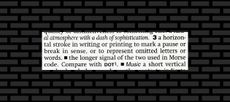Prepositions: The super-handy and horribly confusing widgets of language
To, from, of, by: The little linguistic bits that we use to fit in gaps and hold things together or keep them apart. But it's all rather arbitrary.


Prepositions — connecting words such as to, from, and of — are basic bits of language with clear meaning and function. Right? After all, one of the quickest ways to know someone isn't a native speaker is if they use the wrong one: "Happy birthday for you!" "I'm going at the store during a few minutes."
But why do they use the wrong one in the first place? If the meaning of a preposition is as clear and natural as it seems to us, it shouldn't be so difficult. But it is. This is because prepositions are actually widgets — little bits that we use to fit in gaps and hold things together or keep them apart. We learn which one goes where, but most of the time it's at least a little arbitrary.
Have a look at a few of the many instances where different people in different places use different prepositions for the same things.
Subscribe to The Week
Escape your echo chamber. Get the facts behind the news, plus analysis from multiple perspectives.

Sign up for The Week's Free Newsletters
From our morning news briefing to a weekly Good News Newsletter, get the best of The Week delivered directly to your inbox.
From our morning news briefing to a weekly Good News Newsletter, get the best of The Week delivered directly to your inbox.
Comparison
Americans say "different from" or sometimes "different than." In Britain they often say "different to." So the exact same relationship is expressed with from or to, which are supposed to be antonyms: go to, come from. But a comparison has nothing to do with direction. It could as easily be different by or of — but it's not.
Time
Where I grew up, we said "a quarter to four." When I lived in Boston, everyone said "a quarter of four." Some people say "a quarter till four." To and till are similar, but to and of?
Place
In New York, if you're standing on a sidewalk in a line of people for a ticket to a show, you're waiting on line. Do the same thing in L.A. and you're waiting in line.
I remember my great-grandfather in western New York talking about something that was down in Olean; he would say "That was down to Olean." In what way is in the same as on or to?
Agency, location, instrument, time…
If Stephen King writes a book, the book is by Stephen King. If you luck into a cheap used copy of the book, you may find it by chance. If you set the book next to your bed, it's by your bedside. If you read it to the light of a candle, you read it by candlelight. If you finish reading it no later than midnight, you do so by midnight. And if a train is passing while you're reading, the train is going by you. (For even more uses of by, read "Joined by fate by April.")
So tell me: What is the basic meaning of by? In "by midnight," it's "up to and not including"; if it's "going by you" it's "alongside and not stopping"; if it's "by your bedside" it's "next to and not moving." If it's "by Stephen King," he caused it to come into being — so it started with him; doesn't that sound more like "from"? If it's "by chance" or "by candlelight," by means "with the enablement of" — that's defining it using another two prepositions, with and of. Defining prepositions with other prepositions begins to be like a hall of mirrors.
Other languages
It gets even more fun when you start comparing different languages. A given preposition in one language may be used to express things that are covered with two opposite prepositions in another language — and vice versa. Or one language may use a preposition where another does not.
To supposedly translates into French as à: "give to my wife" is "donner à ma femme." But "canard à l'orange" is not duck to the orange, it's duck with orange; "un verre à vin" is a wine glass — a glass for wine, not a glass to wine. And if you're in Paris, you are "à Paris." What!?
Other prepositions have similar issues. For instance, we say "thank you for" doing something; in French it's "merci de" — "thank you of" doing something.
The same issues come up with any language. In English we dream of or about something; in Spanish, it's "soñar con" — dream with. After supposedly translates into German as nach, but when we say "in my opinion," Germans say "nach meiner Meinung" — "after my opinion." Something may not be to your taste in English, but in German it's "nicht nach deinem Geschmack": "not after your taste." And yet running to a train is different from running in a train or running after a train.
So…
It's not that prepositions are meaningless. You can change meaning quite a bit by changing prepositions. "He speaks well of you" is not the same as "He speaks well to you." "A letter to my mom" is certainly not "a letter from my mom." "He drove to my house" is not at all "He drove by my house." And yet "quarter to four" and "quarter of four" are the same thing; "different to" and "different from" mean the same thing; "dance by the light of the moon" is the same as "dance to the light of the moon."
Have you ever used a paperclip for something other than clipping paper? Used a beer coaster to level a table? This is what prepositions do. We can't be bothered to have a different one for every different possible use, so we just use one that's handy and seems to fit. But once it's chosen, you're expected to know the right one to use. And it varies not only from language to language but even from place to place for the same language.
Good luck.
Create an account with the same email registered to your subscription to unlock access.
Sign up for Today's Best Articles in your inbox
A free daily email with the biggest news stories of the day – and the best features from TheWeek.com
James Harbeck is a professional word taster and sentence sommelier (an editor trained in linguistics). He is the author of the blog Sesquiotica and the book Songs of Love and Grammar.
-
 In the future, will the English language be full of accented characters?
In the future, will the English language be full of accented characters?The Explainer They may look funny, but they're probably here to stay
By James Harbeck Published
-
 10 signature foods with borrowed names
10 signature foods with borrowed namesThe Explainer Tempura, tajine, tzatziki, and other dishes whose names aren't from the cultures that made them famous
By James Harbeck Published
-
 There's a perfect German word for America's perpetually enraged culture
There's a perfect German word for America's perpetually enraged cultureThe Explainer We've become addicted to conflict, and it's only getting worse
By Bonnie Kristian Last updated
-
 The legacy of World War I
The legacy of World War IThe Explainer The Great War ended 100 years ago this month. How does it still shape our world now?
By The Week Staff Published
-
 The death of sacred speech
The death of sacred speechThe Explainer Sacred words and moral terms are vanishing in the English-speaking world. Here’s why it matters.
By Jonathan Merritt Published
-
 The delicate art of using linguistics to identify an anonymous author
The delicate art of using linguistics to identify an anonymous authorThe Explainer The words we choose — and how we use them — can be powerful clues
By James Harbeck Last updated
-
 Dashes and hyphens: A comprehensive guide
Dashes and hyphens: A comprehensive guideThe Explainer Everything you wanted to know about dashes but were afraid to ask
By James Harbeck Published
-
 A brief history of Canadian-American relations
A brief history of Canadian-American relationsThe Explainer President Trump has opened a rift with one of America's closest allies. But things have been worse.
By The Week Staff Published


